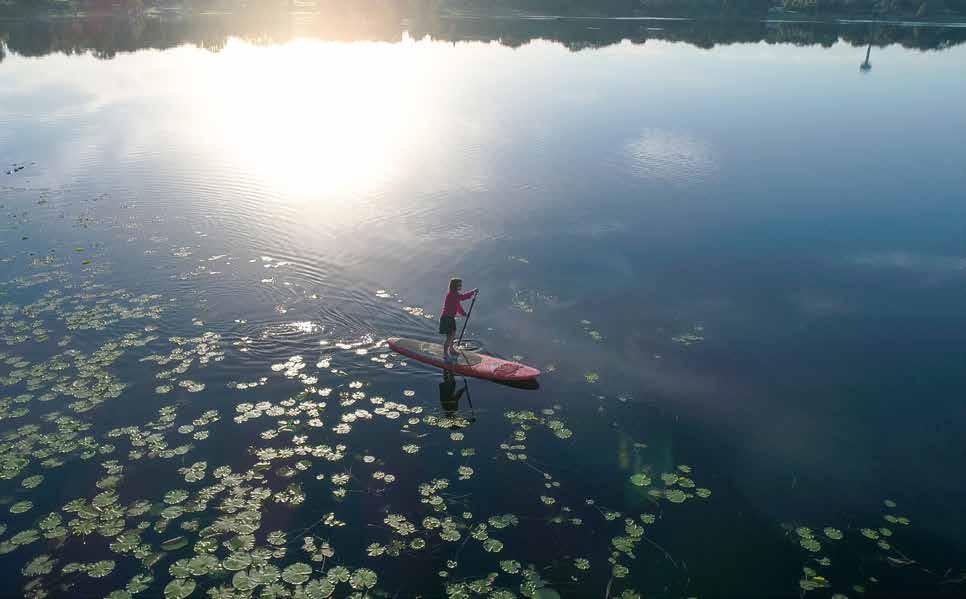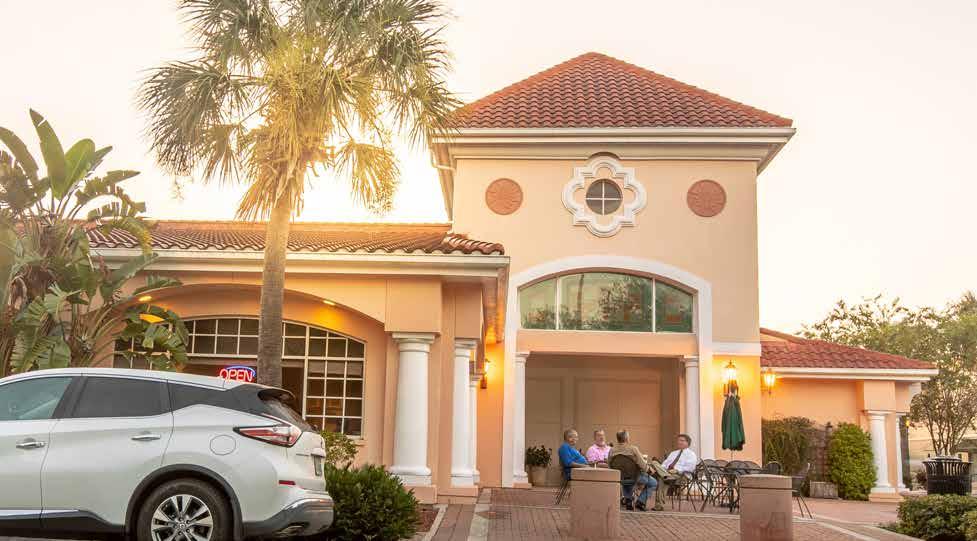
13 minute read
WINTER HAVEN THEN AND NOW
WORDS Tara Crutchfield PHOTOGRAPH Amy Sexson
If teamwork makes the dream work, Winter Haven is living the dream. The last decade has been transformative for the Chain of Lakes city, especially its downtown, thanks in no small part to a collaborative approach to community investment and development. Outgoing President and CEO of the Greater Winter Haven Chamber of Commerce, Katie Worthington Decker, credits collaboration as the city’s ‘secret sauce’ regarding growth and success, a sentiment echoed across both the private and public sectors.
“About ten years ago, we were in the beginning of the renaissance triggered by the public investments the City made in the mid-2000s,” said Worthington Decker. “Investors were starting to come back from the mortgage-crisis recession, but it was still very much the recovery phase. Since then, thanks to individual investors as well as larger groups like Six/Ten, Winter Haven has seen a complete transformation of the downtown core to one that professional, retail, and food and beverage businesses seek out.”
PRIVATE SECTOR INVESTMENT
“Private business owners and real estate investors have played a key role in their willingness to take a risk investing in the community, especially 10-15 years ago when there were no guarantees. That has attracted others to invest,” said Worthington Decker.
Winter Haven-based private developer Six/Ten owns and manages 675,000 square feet of commercial property and is invested more than just financially in transforming the city. Six/ Ten CEO Bud Strang has lived in Winter Haven most of his life. His commitment and that of fellow Six/Ten leadership, Kerry Wilson and Joe Bogdahn, to Winter Haven’s revitalization stem from a passion for the city.
“It’s been a pretty dramatic change in ten years,” said Strang of the city’s incremental but substantial transformation. A decade ago, no one was living downtown, the workforce was about a third of what it is presently, and dining options could be counted on one hand, Strang said.
“Our partners and investors – almost everyone lives here.” Strang notes there are many ways to invest, “but if you can invest in your hometown – where you live, where you work, and play – you get the added satisfaction. You want it to be a good investment, but you’re fixing up your own place. […] We joke that some of the Six/Ten business plans [were made because] we’re getting old and lazy and don’t want to drive to Tampa or Orlando for something fun to do or to go to a nice restaurant.”
The city’s revitalization started quite a bit earlier than a decade ago. The first buildings Six/Ten bought were in the mid-90s. “There was no plan. We didn’t think, ‘We’re revitalizing or redeveloping downtown.’ It was in 2012 when we really took a pause. We said, ‘We’ve got quite a few properties here. Maybe we should be a bit more intentional in terms of how we’re doing this.’” That’s when Six/Ten started looking at downtown as one project from Lake Silver to Citi Centre Plaza and First Street to US Hwy 17. “It’s a mixed-use development from the inside out, and this is the area that we’re going to focus on,” said Strang.
Earlier on, Six/Ten aimed to attract business downtown. They bought up commercial buildings and even started businesses to bring employees to the city’s core. Though still working to bring new businesses to Winter Haven, Strang said Six/Ten’s primary focus has shifted from business recruitment to creating more residential space downtown.
According to design professionals, one feature that makes Winter Haven’s downtown unique is the city’s grid. “We’ve got one of the most walkable downtowns anywhere. […] I think we can leverage that,” Strang said. “We may end up at 600-700 dwelling units Downtown. Some of those may be condominiums. A lot of them will be apartments.”
Strang described residential offerings as “the piece we were missing” and called the housing component “the biggest change going forward” for downtown, drawing even more residents to the city. A market study for the Six/Ten residential project RainDance Apartments, currently under construction on Avenue C SW, estimated 30% of future RainDance residents don’t live in Florida today. Another 3% don’t live in Polk County today.
“You’re going to see a lot more people living downtown. I think you’re going to see more restaurants, bars, and things to do,” Strang predicts.
Additionally, Winter Havenites can anticipate more events. “Things like the Farmers Market have been a great development,” Strang said. The Six/Ten CEO recalls hearing a developer at a conference once say, “We’re developers. We look at the buildings. With a lot of these projects, it’s what happens in between the buildings that determine whether it’s going to be successful or not.” Strang hopes to see more things to do “between the buildings” like the Slow Roll and Ski Show, Winter Haven Farmers Market, and Main Street Winter Haven’s many events.
Worthington Decker notes that economic development organizations like Main Street Winter Haven, the Greater Winter Haven Chamber of Commerce, and the Winter Haven Economic Development Council “understand the pieces they play in the puzzle but also share a common vision of where we want to see Winter Haven go.”
“Perhaps most importantly,” she went on, “the policymakers – our City staff and City Commission have had a pro-business, pro-community enhancement attitude, trying to balance the demands of growth with the desire to remain authentic to who Winter Haven is.”
Eric Labbe, Economic Opportunity and Community Investment Director with the City of Winter Haven heads the Economic
- CONTINUED ON PAGE 24 -
Opportunity and Community Investment Department, involved with growth, development, and redevelopment. The department’s “bigger picture” is “trying to facilitate a growing yet sustainable and resilient community in Winter Haven.”
According to Labbe, Winter Haven has grown by approximately 19,000 people over the last decade, with a 45-50% growth rate. He cited Central Florida’s affordability compared to coastal cities as a partial reason for that growth. Additionally, “Central Florida, and Polk County, in particular, has been expanding its job and economic base for many years.” Across all sectors of the economy from education and manufacturing to distribution, services, and entertainment, “We’ve grown in all of those areas,” said Labbe. “Our job base has been growing. It’s been diversifying, and I think that people are finding that this is a very attractive region to relocate to.”
INDUSTRY THEN AND NOW
Winter Haven’s growth is measurable not only in its number of residents but also in businesses that start or move here. When Worthington Decker started with the Greater Winter Haven Chamber of Commerce in 2014, the organization had 614 members. Their post-pandemic membership sits at 735. “This represents about a 40% market participation of businesses in the Chamber, which is much higher than the 17% national average,” she said. The Chamber president said she hopes to see that number grow, adding, “I think business owners, just like people in general, want to feel they are a part of making the community a better place. Not only do businesses derive benefit from the Chamber through marketing and exposure, by joining the Chamber you are helping to form the future of the community through the Chamber’s advocacy and stay connected and informed.” Worthington Decker believes Winter Haven has become an attractive community for industry because of its growth and strong workforce. “We have aimed to maintain the authentic, neighborly feel. We are also an inclusive community. One that is not afraid to acknowledge the mistakes and biases of our past and learn, grow and improve to ensure that everyone feels like they can find a place here, open a business here. That is a constantly evolving side of any community, but one that leadership in this community has put at the highest priority. We also try to do everything in our power to make it easy for someone to invest here. Our City government is investing in people and platforms to help streamline a business’s (and citizen’s) interactions with the City.”
A decade ago, Winter Haven’s primary industries were agriculture, healthcare, and business and professional services. “Today, healthcare still remains a high growth and leading industry with the expansion of Baycare, Bond Clinic, Gessler, and now AdventHealth. Numerous other healthcare businesses have opened in the last ten years as a result of the increasing demand of the area,” Worthington Decker said.
She noted that though citrus is no longer a dominant industry, companies like WG Roe continue to invest in the area and expand. “The shift in ag has been towards agribusiness and not such growing for food, but for food flavoring and extracts.”
“Thanks to CSX, logistics has become a more predominant targeted industry, and although it has taken almost eight years, we now see Florida Can Manufacturing and Coca Cola around the ILC (Intermodal Logistics Center),” she said.
Worthington Decker thinks the City and economic development organizations would like to see more manufacturing in the area over distribution. “Business and professional services remain a core industry as well as data management and storage.”


Photo provided by Winter Haven Chamber of Commerce
TOURISM REVITALIZED
“Tourism in Polk County was at the start of recovery with the opening of LEGOLAND on October 15, 2011,” said Katie Worthington Decker.
The theme park built for kids celebrated its tenth birthday on October 15, 2021. Winter Haven Mayor Brad Dantzler attended the event to present a proclamation naming October 15 ‘LEGOLAND Day.’ During his speech, the mayor praised LEGOLAND for building on the rich history of Cypress Gardens and went on to refer to them as “ideal corporate citizens.” He noted that the resort provides over 1,000 jobs to the city, sends employees to college through a partnership with Polk State College, cleans up the lakes, invests in solar, and treats their employees with respect. “Winter Haven could not be more proud and more happy to have them as part of our community,” said Mayor Dantzler.
LEGOLAND’s success has inspired the renaissance of Polk County’s tourism industry first brought to the area by its predecessor and the state’s first commercial theme park, Cypress Gardens. Over the ten years that LEGOLAND Florida Resort has been open, the park has welcomed millions of families from across the world to Winter Haven – families who dine and shop at local businesses during their visit.
The resort’s parent company, Merlin Entertainments, continues to invest through new attractions, the expansion of hotel properties, and the world’s first Peppa Pig Theme Park, slated to open this February. “That commitment to growth and expansion for LEGOLAND Florida Resort I think has benefited the community at large through not only direct employment, [...] but also the indirect economic impact that visitors to LEGOLAND then have within the broader community,” said LEGOLAND Florida Resort president and managing director for the North America LEGOLAND Resorts, Rex Jackson.
Relationships at the government level with the City and County, in addition to many other community organizations and businesses like AdventHealth, Polk State College, and Grove Roots Brewing Company, have been instrumental to LEGOLAND Florida Resort’s auspicious decade. Jackson said, “Over the past ten years [...] LEGOLAND Florida has been able to embed itself into the community [...] because of the open arms that the community has had. [...] I think that has contributed to the success LEGOLAND Florida has had, which then also contributes to the success of the community.”
DOWNTOWN – THE ‘HEARTBEAT’ OF ECONOMIC IMPACT
Winter Haven’s downtown district has received considerable attention from the private and public sectors. Eric Labbe called downtown our “identity” and the “heartbeat” of economic impact within the community. “From a value per acre standpoint, properties are valued higher in the downtown core. So, communities get more ‘bang for their buck’ in the downtown,” he said, adding that growth in the core “helps to solidify your economic base within the community.”
The City has purposefully set up land development codes and regulations to encourage downtown’s mixed-use environment of citizens living, working, and deriving entertainment there.
According to Labbe, a robust downtown also helps the traffic situation by reducing vehicle trips on adjacent roadways and makes providing municipal services more efficient than in sparse residential suburbs and on the outskirts of the city.
“Twenty years ago, in Winter Haven, there wasn’t much there,” said Labbe. People across all industries have been working for years to change that. “That’s from private developers that are investing time and capital downtown to community partners like the Winter Haven Economic Development Council, the Chamber of Commerce, Main Street Winter Haven, City folks in our department, and other departments who are working and want to see downtown thrive.”
The synergy between public and private investment in Winter Haven has encourage growth across the community. Six\ Ten’s Bud Strang called public investment “really important.” From moving the Winter Haven Public Library downtown to streetscaping and maintaining public parks, he said that investment of public dollars makes it “very attractive for the private sector to come in behind them and do the for-profit [projects].”
Eric Labbe notes that data consistently shows public investment in infrastructure incentivizes private sector investment. “We have seen that locally through the years with our investments in complete street projects, water and sewer infrastructure, and recreational amenities,” he said.
BURSTING AT THE SEAMS
“If you look at growth trends across the county [...] Winter Haven has been growing somewhere between 4-5% annually for the last five or six years. Lakeland, in comparison, is growing at about 1%. When you see statistics that the Lakeland/Winter Haven metropolitan area is the second-fastest-growing MSA (Metropolitan statistical area) in the nation – one of the fastestgrowing counties in the nation – the east side of the county, Winter Haven particularly, is driving a lot of that,” said Labbe, referring to census data showing the Lakeland/Winter Haven metro area tied with Boise City, Idaho for second-highest rate of growth between 2019 and 2020.
As Winter Haven swells with new residents, the City prioritizes projects to accommodate that growth. Labbe detailed investments that the City of Winter Haven is making, including new fire stations and public safety units. They are working with FDOT and Polk County on transportation improvements. Phase II of the Chain of Lakes Complex project is funded, which will entail a complete rehab and redevelopment of the baseball fields and more utilization of the Lake Eloise lakefront, along with Phase II of the Lake Maude Park project, adding multipurpose and baseball fields, as well as the construction of a brand new Northeast Recreation and Cultural Center which will replace the aging center on Martin Luther King Boulevard. Construction on a trail around Lake Elbert reminiscent of Lakeland’s Lake Hollingsworth Trail is set to begin within the year.
Several hotel projects are slated for downtown, and the City is working with affordable housing providers to bring multi-family projects to Winter Haven, as well as with private developers in the downtown area where apartment units are already under construction. Labbe noted that the City would continue its work on utility improvements in water and wastewater.
Labbe anticipates the trend will continue with an estimated 3-5% annual growth. Ten years from now, “We will likely be a community somewhere around 65,000 to 70,000 people. [...] I think that a lot of people throughout Florida and throughout the nation are recognizing what Polk County and Winter Haven have to offer – and it shows in our growth.”








